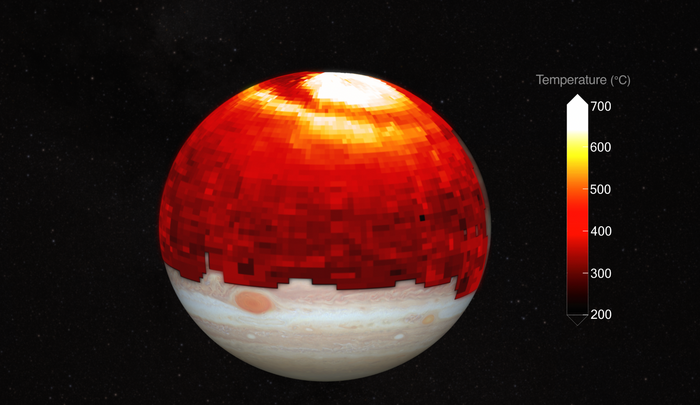An unexpected ‘heat wave’ of 700 degrees Celsius, extending 130,000 kilometres (10 Earth diameters) in Jupiter’s atmosphere, has been discovered. James O’Donoghue, of the Japanese Aerospace Exploration Agency (JAXA), has presented the results this week at the Europlanet Science Congress (EPSC) 2022 in Granada.

Credit: Hubble / NASA / ESA / A. Simon (NASA GSFC) / J. Schmidt. Credit: James O’Donoghue
An unexpected ‘heat wave’ of 700 degrees Celsius, extending 130,000 kilometres (10 Earth diameters) in Jupiter’s atmosphere, has been discovered. James O’Donoghue, of the Japanese Aerospace Exploration Agency (JAXA), has presented the results this week at the Europlanet Science Congress (EPSC) 2022 in Granada.
Jupiter’s atmosphere, famous for its characteristic multicoloured vortices, is also unexpectedly hot: in fact, it is hundreds of degrees hotter than models predict. Due to its orbital distance millions of kilometres from the Sun, the giant planet receives under 4% of the amount of sunlight compared to Earth, and its upper atmosphere should theoretically be a frigid -70 degrees Celsius. Instead, its cloud tops are measured everywhere at over 400 degrees Celsius.
“Last year we produced – and presented at EPSC2021 – the first maps of Jupiter’s upper atmosphere capable of identifying the dominant heat sources,” said Dr O’Donoghue. “Thanks to these maps, we demonstrated that Jupiter’s auroras were a possible mechanism that could explain these temperatures.”
Just like the Earth, Jupiter experiences auroras around its poles as an effect of the solar wind. However, while Earth’s auroras are transient and only occur when solar activity is intense, auroras at Jupiter are permanent and have a variable intensity. The powerful auroras can heat the region around the poles to over 700 degrees Celsius, and global winds can redistribute the heat globally around Jupiter.
Looking more deeply through their data, Dr O’Donoghue and his team discovered the spectacular ‘heat wave’ just below the northern aurora, and found that it was travelling towards the equator at a speed of thousands of kilometres per hour.
The heat wave was probably triggered by a pulse of enhanced solar wind plasma impacting Jupiter’s magnetic field, which boosted auroral heating and forced hot gases to expand and spill out towards the equator.
“While the auroras continuously deliver heat to the rest of the planet, these heat wave ‘events’ represent an additional, significant energy source,” added Dr O’Donoghue. “These findings add to our knowledge of Jupiter’s upper-atmospheric weather and climate, and are a great help in trying to solve the ‘energy crisis’ problem that plagues research into the giant planets.”




